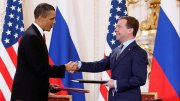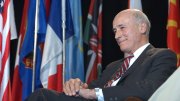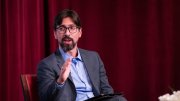Former Harvard president Lawrence H. Summers lived up to his billing as a voice of opposition Wednesday evening at a Harvard Kennedy School (HKS) discussion on China’s rise as an economic power and its rivalry with the United States. Timed to the Beijing Olympics, the event was led by political scientist Graham Allison, Dillon professor of government and a former HKS dean, whose 2017 book was titled: Destined for War: Can America and China Escape Thucydides’s Trap? He steered a panel of experts through questions about China’s manufacturing prowess, trade partnerships, poverty alleviation, and technological innovations. “Looking ahead, despite all the uncertainties,” Allison asked, framing the discussion during his introductory remarks, “should we expect China to continue growing at twice or more the rate of the U.S. over the decade ahead?”
Attempting to answer that question were Summers, Eliot University Professor and a former U.S. Secretary of the Treasury and chief economist of the World Bank; Kelly Sims Gallagher, a Tufts environmental-policy professor who served in the Obama Administration as a senior policy adviser relating to China and climate change; and Keyu Jin ’04, Ph.D. ’09, an economist at the London School of Economics whose research focuses on China, her home country.
The Chinese Powerhouse
The panelists offered abundant evidence for the argument that China has overtaken the United States as a world economic power. “China’s become the workshop of the world,” Allison said, noting that it accounts for 29 percent of global manufacturing (the United States stands at 18 percent), and that China is now the largest trading partner for nearly every major world economy. “Starbucks opens a new [store] in China every 12 hours,” he added, and KFC has twice as many restaurants there as in the United States. “And China has shown that it can build transportation infrastructure in a way that’s shameful for Americans,” he said, pointing to its 23,000 miles of high-speed rail—the United States has none. He also noted China’s “anti-poverty miracle” of economic reforms: the share of the population living on $2 or less per day shrank from 90 percent in 1972, when President Richard Nixon first visited the country, to less than 1 percent in 2018. And on the question of which country has the largest economy—a subject of debate among experts—Allison agreed with the CIA-produced World Factbook, which ranks China as number one.
Gallagher said that China is “winning the race” for clean-energy jobs. Noting that its economic growth over the past 40 years came at considerable environmental cost—air pollution, water pollution, climate-change damage—she said that now China has begun pivoting to the economic opportunity in green industries. The past decade has seen tremendous growth in wind and solar energy industries, she said, and in 2020, China generated 4.7 million new renewable-energy jobs, 40 percent of the worldwide total. The United States, meanwhile, generated only 838,000 renewable-energy jobs: 7 percent of the global total.
Jin, who grew up in China during the 1980s and ’90s, argued for a surprising economic benefit of the country’s one-child policy, which began with her generation: female empowerment. The policy “led to much higher education for the only child of the family,” she said, including girls. “Which is why we see so many female CEOs, female leaders in the political and business arena.” She also pointed to the country’s growth in entrepreneurship and technological innovations, especially so-called “1-to-N” innovations, which build and expand on the fundamental (“zero-to-1”) technologies that were invented mostly in the United States. “This is where China’s going in the future,” Jin said, “which is to push for breakthrough technologies, high-tech technologies.”
The Per-Capita Perspective
“I think my role is to be a bit of a dissenter here,” Summers said when it was his turn to speak. He acknowledged that “there’ve been remarkable accomplishments over the past two-and-a-half generations in China.” But his argument centered on the idea that analysts often conflate “scale and level” when talking about China’s economic rise, leaving out per-capita considerations. The country’s population is about four times as large as the United States’, he noted, “and that means that on any indicator of total scale—GDP [Gross Domestic Product], the number of good ideas, total manufacturing output, the extent of trade with any other country—by virtue of having 4.2 times as many people, you would expect it to be much larger.”
But examined on a per capita basis, the Chinese GDP today, he contended, corresponds to the U.S. level in 1950. “And so I think the portrayal of China as some kind of super-state is importantly misleading.” He added, too, regarding future growth, “It’s important to recognize that China is going to have something that’s almost without precedent: a substantially shrinking labor force over the next decade.” He was referring to the one-child policy, which ended in 2016. The policy was effective in stopping China’s spiraling population growth, but a smaller future labor force is the other side of that success. “We don’t have a lot of experience on the question of what that means for countries. But one experience we do have is Japan, and that’s not an encouraging reading.”
The other panelists pushed back. “I don't agree at all with Larry’s proposition that this is simply a matter of fiddling the numbers,” Allison said. “If Starbucks is wondering how many lattes they sell, they have pretty good numbers. And if Elon Musk is wondering how many cars he sells, he has pretty good numbers.” Gallagher emphasized that an important question is not merely the size of growth, but the “quality” of it. “If we’re taking the climate-change issue seriously, this is the pivotal decade where we need to really transform economies”—and China is much better poised to do so, as climate change becomes an increasing factor in countries’ economic trajectories.
Jin, too, questioned Summers’s formulations. Regarding the shrinking labor force, she argued that rising productivity—China’s manufacturing productivity has grown 10 percent annually in the last decade, she said—is as important a factor in the country’s future growth as the shrinking number of workers. Plus, “We must not forget that the Chinese government, despite how it appears, is one of the most flexible and adaptive governments with highly adjustable policies....The government will very swiftly adjust and readjust its policies to include more openness, or to have more liquidity in the economy, in a very flexible way that other governments don’t necessarily enjoy, including the U.S.”
“The American Dream Is Now Found in China”
Later in the discussion, Jin also challenged an argument Summers had made about the United States’ overwhelming advantage in attracting talented immigrants from around the world. He said that the American university sector puts it on “an entirely different level than any other country in the world, and certainly an entirely different level than China.” The culture of “academic freedom, free inquiry, freedom to argue and criticize, and vigorously competing institutions for talent,” he added, is “an enormous asset that, over time, is what shapes destiny.”
But Jin countered that, increasingly, Chinese students who come to the United States to study end up returning home to work. “One really key statistic is that Chinese students who have Harvard degrees, Princeton degrees, or have worked at Google and Facebook are returning to China,” she said. “About 80 percent of them have returned years after their graduation. This was not the case at all 20 years ago....I would say that that is also an indication of China and the opportunity that it gives.” She added: “The American dream is now found in China.”
The evening ended with questions from the audience, on topics ranging from the Chinese government’s recent crackdowns on billionaires to Olympic gold-medal-winner Eileen Gu, a skier born and raised in San Francisco who decided to compete for China, her mother’s birthplace, in the Beijing Olympics. But the final question of the night seemed to hammer home the urgency of the entire event’s discussion. Noting what he saw as China’s increasing “hegemony,” one audience member asked, “What will it take for the United States to acknowledge China as a potential threat?”
Summers’s expression darkened. China, he said, is seen already by “everyone in Washington” as a serious threat—to a degree, in fact, that’s perhaps problematic. “I think there’s an enormous alarm” among American officials, in some ways exceeding previous worries about Japan’s economic competition or even the Soviet Union. “And I think we need to be very careful…there is a not-implausible view of history, which holds that after the United States mobilized itself in a highly truculent way after Sputnik and around the missile gap, the Soviet Union became very alarmed about its ability to maintain its position, its ability to stand strong. And that encouraged its adventurism, with the placement of missiles in Cuba, which caused the most dangerous week in the history of humanity”—the Cuban Missile Crisis. “I think the danger is that if we react with excessive alarm to what are legitimate concerns and we start emulating Chinese practices and policies, the world will become a much less stable place.”
Then, returning to a point he’d made earlier in the evening, about the fallacy of zero-sum calculations in comparing economic success for the United States and China, he said, “My hope is that on both sides, the temperature can be taken down. And that the goal can be respectful coexistence, rather than the triumph of one’s own system.”








